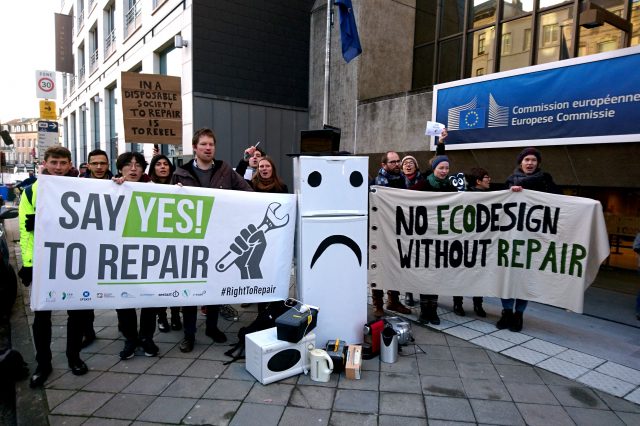Originally published at: https://therestartproject.org/right-to-repair/ecodesign-forum-here-we-come/
We’re happy to announce that Restart has been accepted as a member of the new EU’s Ecodesign Forum.
For us, this is quite a big deal. The Forum is a new group created as part of the recently approved EU Ecodesign for Sustainable Products Regulation (ESPR). It’s meant to be a space for experts to provide insights and contributions to help shape specific legislation that improves the design of future products to be sold in the EU. It builds on a former “Ecodesign Consultation Forum”, which will remain active until it clears the backlog of legislation in development, including repairability criteria for printers, vacuum cleaners and computers.
Bringing new perspectives
Those of you following our work on Right to Repair have probably heard us complain in the past about the slow process in the development of ecodesign legislation, as well as the lack of representation for repair organisations, repair communities and other members of civil society within the Consultation Forum. In the last few years we’ve been able to attend and bring our perspective to a few of these meetings, nominated by the European Environmental Bureau – the largest environmental think tank, of which we’re a proud member. But since we began following these topics, there has been simply no opportunity for us or any other organisation to have our voices and perspectives join this important policy forum.
That’s why we celebrate not just our inclusion in the Ecodesign Forum as one of 100 member organisations, but also that a range of our key partners and allies have joined too, including HOP, RREUSE, ECOS, EBB, as well as other great NGOs such as Client Earth. It is worth acknowledging that the vast majority of the Forum’s members are still industry-oriented, but we’ll make sure to contribute much needed voices, perspectives and the urgency for achieving real change as rapidly as possible.
Raising the bar
Restart applied to be a member for three key reasons. As a founding member of Right to Repair Europe, we want to be able to share insights and position papers we develop as part of this growing coalitions of partners, making sure that our demands for truly ambitious repairaibility goals get heard.
From day one we’ve championioned the power of communities to shape the future of repair. For more than a decade, all our work collecting and sharing data on key barriers to repair experienced by real people at community repair events has been aimed at raising these issues as broadly as possible. So we’re thrilled to be able to bring insights we developed with partners—such as our most recent report The Rise of Community Repair—to the attention of EU policymakers. And we’ll remind them frequently that there’s still no Right to Repair in sight for 96% of products we see at repair events.
But there’s one more reason. As a UK-based organisation, we know that when it comes to ecodesign legislation, the EU is the main entity influencing the future design of products via regulation. This work is happening too slowly even in the EU, but it’s barely happening at all elsewhere. So we’re grateful for the opportunity to contribute to shaping its future. The mandate of the Ecodesign Forum starts with important conversations on expanding the range of products covered by future legislation, for example by coming up with “horizontal” requirements for repairability – essentially regulations applying across multiple product categories, not just ‘smartphones’ or ‘washing machines’. We will try our best to contribute effectively to these conversations, and to bring the most helpful examples from our wide community of partners and from community repair volunteers around the world to help make the case for truly repairable, longer lasting products.
From the street to the conference room
One final anecdote. As you can see in the picture above, back on 10th December 2018 we were outside the building where the Ecodesign Forum hosts its meetings. We will never forget that day — when we ran the first Right to Repair protest in Europe — the beginning of the movement we belong to with pride. From today, we’re formally granted access to the meeting room where decisions are made, and we commit to keep on pushing for real change to happen, hopefully quickly enough!
